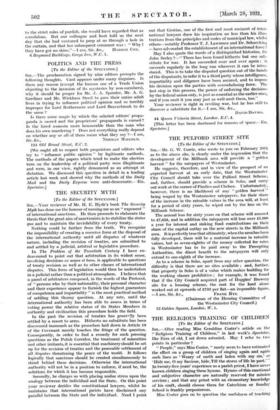POLITICS AND THE PRESS
[To the Editor of the SPECTATOR.] SIR, —The proclamation signed by nine editors prompts the following thoughts. Cant appears under many disguises. Is there any reason (except the human one of a Trade Union objecting to the invasion of its mysteries by non-members), why it should be proper for Mr. J. A. Spender, Mr. A. G. Gardiner and Mr. Wickham Steed to pass their entire adult lives in trying to influence political opinion and so terribly improper for Lord Rothermere and Lord Beaverbrook to do the same ?
Is there some magic by which the salaried editors' propa- ganda is sacred and the proprietors' propaganda is cursed ? Is the hired assassin more honourable than the man who does his own murdering ? Does not everything really depend on whether any or all of them mean what they say ?—I am,
124 Old Broad Street, E.C. 2.
[We ought all to respect both proprietors and editors who
try to "influence public opinion" by legitimate methods. The methods of the papers which tried to make the election turn on the leadership of a political party were illegitimate and were, in our view, rightly denounced as an attempt at dictation. We discussed this question in detail in a leading article last week and showed why the methods of the Daily Mail and the Daily Express were anti-democratic.—En. Spectator.]














































 Previous page
Previous page